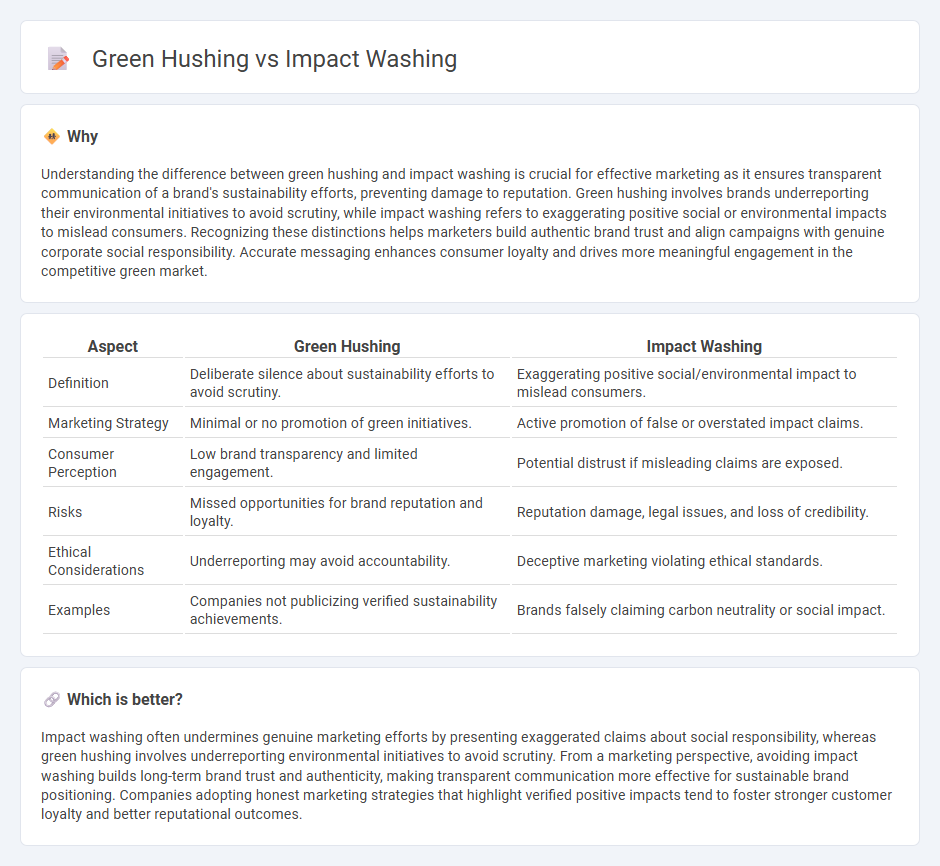
Green hushing involves companies deliberately downplaying their environmental initiatives to avoid scrutiny or skepticism, whereas impact washing refers to exaggerating or fabricating social and environmental efforts to enhance brand image. Both practices undermine authentic marketing strategies aimed at sustainability and can erode consumer trust. Discover how to differentiate genuine corporate responsibility from misleading claims in marketing.
Why it is important
Understanding the difference between green hushing and impact washing is crucial for effective marketing as it ensures transparent communication of a brand's sustainability efforts, preventing damage to reputation. Green hushing involves brands underreporting their environmental initiatives to avoid scrutiny, while impact washing refers to exaggerating positive social or environmental impacts to mislead consumers. Recognizing these distinctions helps marketers build authentic brand trust and align campaigns with genuine corporate social responsibility. Accurate messaging enhances consumer loyalty and drives more meaningful engagement in the competitive green market.
Comparison Table
| Aspect | Green Hushing | Impact Washing |
|---|---|---|
| Definition | Deliberate silence about sustainability efforts to avoid scrutiny. | Exaggerating positive social/environmental impact to mislead consumers. |
| Marketing Strategy | Minimal or no promotion of green initiatives. | Active promotion of false or overstated impact claims. |
| Consumer Perception | Low brand transparency and limited engagement. | Potential distrust if misleading claims are exposed. |
| Risks | Missed opportunities for brand reputation and loyalty. | Reputation damage, legal issues, and loss of credibility. |
| Ethical Considerations | Underreporting may avoid accountability. | Deceptive marketing violating ethical standards. |
| Examples | Companies not publicizing verified sustainability achievements. | Brands falsely claiming carbon neutrality or social impact. |
Which is better?
Impact washing often undermines genuine marketing efforts by presenting exaggerated claims about social responsibility, whereas green hushing involves underreporting environmental initiatives to avoid scrutiny. From a marketing perspective, avoiding impact washing builds long-term brand trust and authenticity, making transparent communication more effective for sustainable brand positioning. Companies adopting honest marketing strategies that highlight verified positive impacts tend to foster stronger customer loyalty and better reputational outcomes.
Connection
Green hushing and impact washing intersect as deceptive marketing practices that manipulate consumer perception of corporate sustainability efforts. Green hushing involves deliberately withholding information about environmental initiatives to avoid scrutiny, while impact washing exaggerates or fabricates positive impact claims to boost brand image. Both strategies undermine genuine transparency and hinder informed decision-making in the marketing landscape.
Key Terms
Greenwashing
Greenwashing involves companies misleading consumers by exaggerating or fabricating their environmental efforts, while impact washing refers to overstating positive social or environmental impacts. Both practices erode consumer trust and hinder genuine sustainability progress by masking true corporate responsibility. Discover how to identify greenwashing and promote authentic environmental transparency.
ESG (Environmental, Social, and Governance)
Impact washing refers to organizations overstating or misrepresenting their ESG achievements to appear more sustainable, while green hushing involves companies deliberately minimizing or hiding their ESG efforts to avoid scrutiny or criticism. Both practices undermine genuine ESG progress and erode stakeholder trust, hindering transparent corporate responsibility and sustainable development. Explore effective strategies to distinguish authentic ESG actions from misleading claims and enhance your company's credibility.
Corporate Transparency
Impact washing involves companies exaggerating or fabricating their environmental and social performance to appear more responsible, thereby undermining genuine corporate transparency. Green hushing refers to organizations deliberately underreporting or withholding their sustainability initiatives to avoid scrutiny or criticism, which also limits stakeholder insight into true corporate impact. Explore how these contrasting approaches affect corporate transparency and stakeholder trust in sustainable business practices.
Source and External Links
What is Impact Washing? Meaning and how to avoid it - Impact washing involves disinformation disseminated by organizations to misrepresent their actual impact, often overshadowing genuine social and environmental improvements.
Impact washing: what is it and how to spot it - Impact washing refers to unsubstantiated marketing claims about products or investments that purportedly trigger positive economic changes.
Impact Washing: What It Is & How to Stop It - Impact washing occurs when fund managers or bond issuers exaggerate or falsely claim the positive impact of their investments on society or the environment.
 dowidth.com
dowidth.com